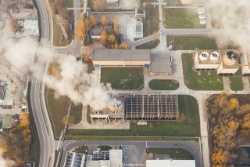New Zealand Being Left Behind As Countries Invest In Manufacturing
New Zealand manufacturers are being left behind as other countries build up support for their manufacturing industries through COVID-19 and beyond, says the New Zealand Wood Processors and Manufacturers Association (WPMA).
A new report released today by the WPMA ‘International Manufacturing Policy and Programme Responses to COVID-19’ documents major interventions by New Zealand’s main trading partners.
The report by MartinJenkins consultancy details that in 2020, around 200 countries introduced COVID-related economic support measures worth an estimated US$12-17 trillion, representing 13-19% of global GDP.
Countries like Australia, Singapore and South Korea have introduced major manufacturing strategies to grow the value of their manufacturing sectors and build resilient supply chains. Many other countries have used the COVID crisis to accelerate investment in digital and low-emission technologies to support productivity growth and the transition to a low carbon future.
“At a time when COVID support is being wound back here, our trading partners are upping the ante to kick start and support recovery efforts and, in some cases drive forward substantial industrial innovation strategies,” says WPMA Chair Brian Stanley.
“While New Zealand has rebounded well from the recession, GDP and production have not yet returned to pre-COVID levels.
“The immediate challenge is that COVID continues to change everything and we can’t sit back and rely on NZ’s traditional processes to respond to those challenges.
“Our wood manufacturers are now up against international competitors receiving substantial and ongoing additional assistance.
“Furthermore, this is all happening within a trade environment where barriers remain high. We need to see urgent government efforts with the private sector to support the competitiveness of our manufacturers in global markets where there is now scant regard for WTO rules.”
Another factor is that the completion of New Zealand’s Industry Transformation Plans will be around mid-2021 meaning any initiatives are not likely be in place before the end of 2021 at the earliest.
“We can’t wait till the end of the year while other countries are already implementing policy and programme support. Other countries are moving fast to bolster their value-adding industries and our manufacturers are seriously getting left behind.”
WPMA Vice-Chair John Eastwood and senior executive for the trans-Tasman engineered wood manufacturer XLAM, says the recent proposed closure of the Whakatane mill highlights the need for government to prevent further decline.
“It’s yet another casualty in a long line of closures in our domestic wood processing industry due to the failure of successive governments to address unfair trade environments and support the competitiveness of our manufacturers.
“There are some key levers government can and must pull immediately to assist manufacturers.”
The WPMA is proposing the following immediate interventions:
- Accelerated depreciation – enabling capital investment in digital, Industry 4.0 and greenhouse gas emissions reduction technologies to be fully depreciated in the first year. Peer countries such as Australia, Singapore and Finland have adopted or enhanced accelerated depreciation measures in response to COVID.
- Government procurement – embedding domestic manufacturing in the pipeline of major infrastructure and housing projects being delivered over the next decade through improved pre-commercial procurement processes with industry, requiring partnerships with local businesses and adopting content requirements for projects such as local capability development or carbon neutrality. Several competing economies have adopted procurement measures to bolster domestic purchasing following COVID, including India, South Korea, Israel and states in Australia.
- A step change in R&D support – significantly increasing the level and accessibility of R&D funding available to enable New Zealand manufacturing to transition to a low carbon future. This would be consistent with recommendations in the Climate Change Commission’s recent report. A range of OECD economies have introduced significant financial packages to accelerate the development and commercialisation of circular economy and low-emissions technology R&D as part of their recovery strategies.
Mr Stanley says New Zealand is missing an opportunity now and in the medium term to set policies that encourage higher levels of investment in our wood manufacturing sector.
“New Zealand’s post COVID economic recovery, particularly the infrastructure / construction pipelines and shovel ready projects are under threat because of shipping delays. Given the $129b infrastructure pipeline over the next decade, and the significant housing deficit, government needs to think differently and to act quickly.”


 MBIE: MBIE Publish Mid-Point Review Of The Phase-Out Of The Low Fixed Charge (LFC)
MBIE: MBIE Publish Mid-Point Review Of The Phase-Out Of The Low Fixed Charge (LFC) Science Media Centre: Company Claims To Have “De-Extincted” The Dire Wolf – Expert Reaction
Science Media Centre: Company Claims To Have “De-Extincted” The Dire Wolf – Expert Reaction Stats NZ: Greenhouse Gas Emissions Fall 2.0 Percent In The December 2024 Quarter
Stats NZ: Greenhouse Gas Emissions Fall 2.0 Percent In The December 2024 Quarter The Reserve Bank of New Zealand: Christian Hawkesby Appointed As Governor Of The RBNZ
The Reserve Bank of New Zealand: Christian Hawkesby Appointed As Governor Of The RBNZ Kiwi Economics: It’s Mayhem In Markets As Downside Risks Dominate Following Trump’s Tariffs
Kiwi Economics: It’s Mayhem In Markets As Downside Risks Dominate Following Trump’s Tariffs Mindful Money: Consumer Demand For Ethical Investing Remains Strong Despite International Headwinds
Mindful Money: Consumer Demand For Ethical Investing Remains Strong Despite International Headwinds



